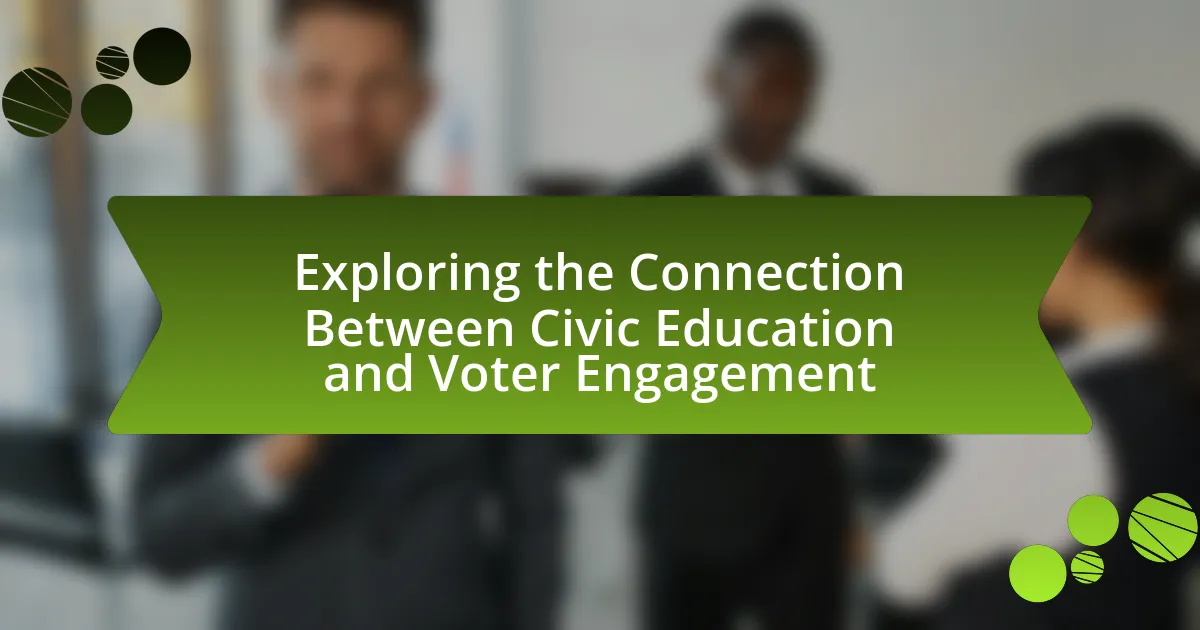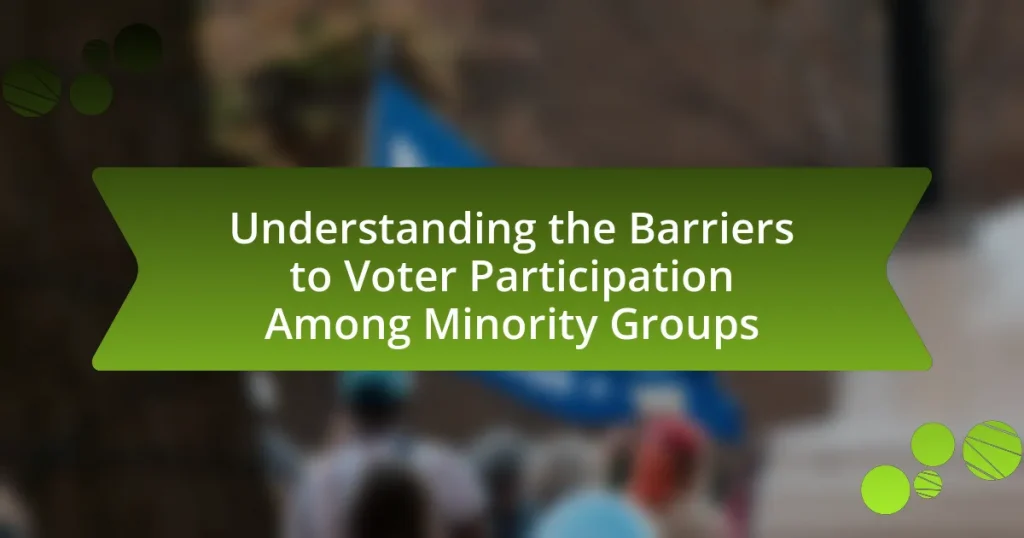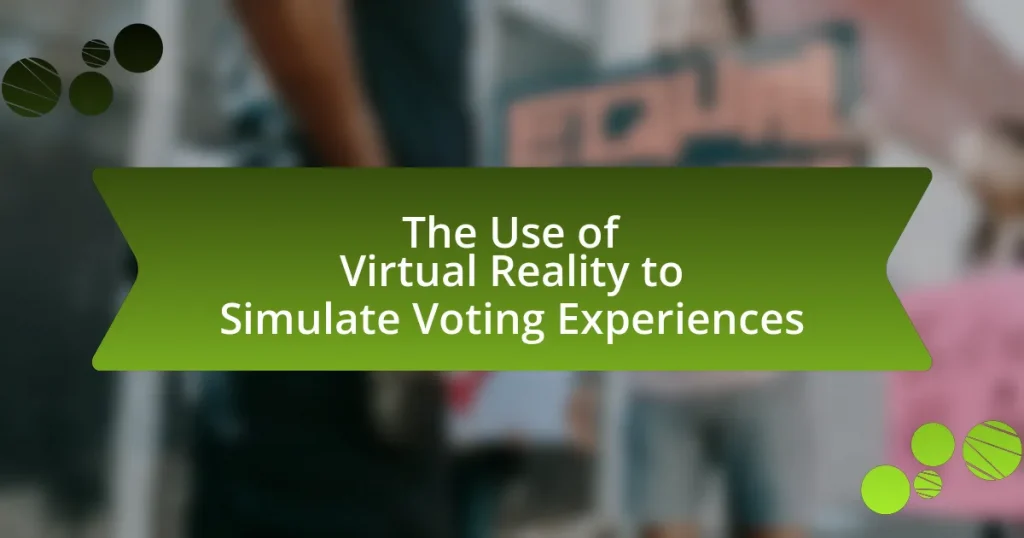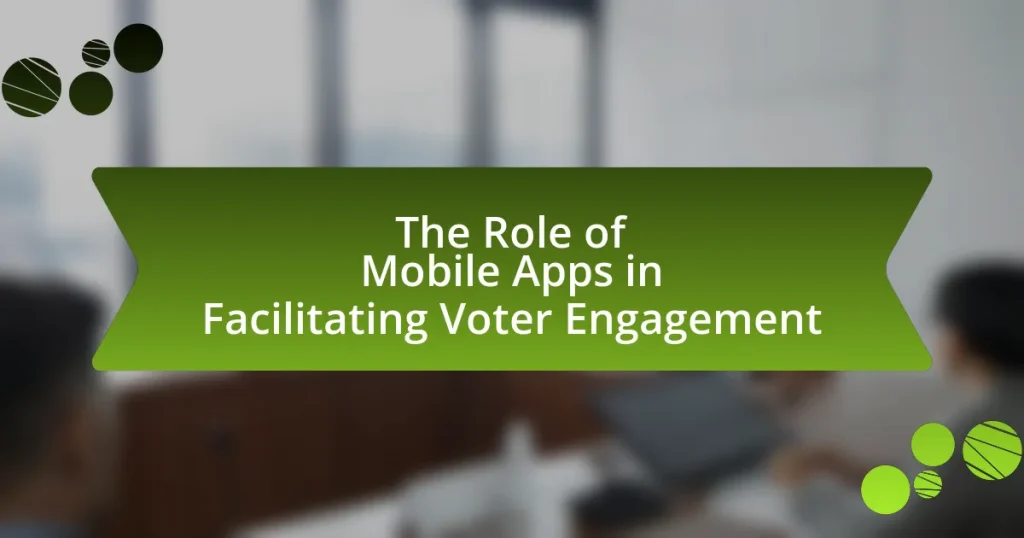The article explores the critical connection between civic education and voter engagement, highlighting how civic education equips individuals with the knowledge and skills necessary for effective participation in the democratic process. It discusses the positive correlation between civic education and increased voter turnout, supported by research from the Center for Information and Research on Civic Learning and Engagement (CIRCLE). Key components of effective civic education, such as understanding government structures and civic rights, are outlined, along with the challenges in implementing these programs, including socioeconomic disparities and lack of resources. The article emphasizes the importance of informed voting and the role of community organizations and technology in enhancing civic education to foster greater voter engagement.
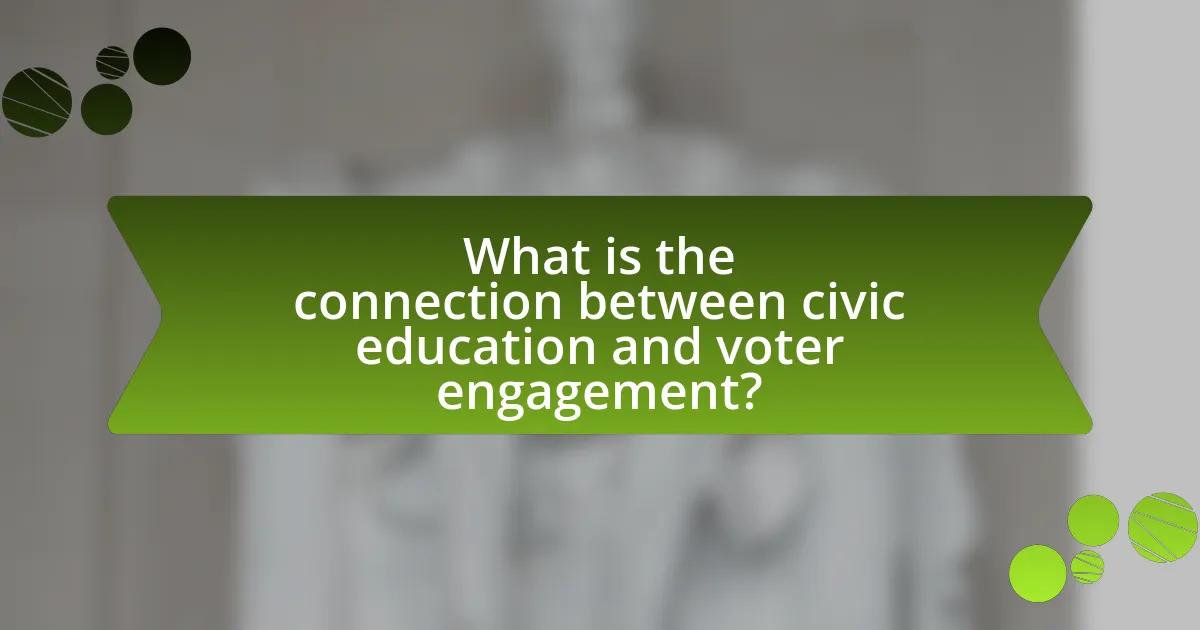
What is the connection between civic education and voter engagement?
Civic education directly enhances voter engagement by equipping individuals with the knowledge and skills necessary to participate effectively in the democratic process. Studies indicate that individuals who receive civic education are more likely to vote, as they understand the importance of their participation and the functioning of government. For instance, research conducted by the Center for Information and Research on Civic Learning and Engagement (CIRCLE) shows that students who participate in civic education programs are significantly more likely to vote in elections compared to those who do not receive such education. This correlation underscores the critical role that civic education plays in fostering informed and active citizens who are engaged in the electoral process.
How does civic education influence voter participation?
Civic education significantly enhances voter participation by equipping individuals with the knowledge and skills necessary to engage in the democratic process. Research indicates that individuals who receive civic education are more likely to understand their rights and responsibilities, leading to increased voter turnout. For instance, a study by the Center for Information and Research on Civic Learning and Engagement (CIRCLE) found that students who participated in civic education programs were 20% more likely to vote compared to their peers who did not receive such education. This correlation demonstrates that informed citizens are more inclined to participate in elections, thereby strengthening democratic engagement.
What are the key components of effective civic education?
The key components of effective civic education include knowledge of government structures, understanding civic rights and responsibilities, critical thinking skills, and active participation in community and political processes. Knowledge of government structures equips individuals with an understanding of how local, state, and federal systems operate, which is essential for informed citizenship. Understanding civic rights and responsibilities fosters awareness of individual roles within a democracy, promoting accountability and engagement. Critical thinking skills enable citizens to analyze information, evaluate sources, and make informed decisions, which is crucial in a democratic society. Active participation encourages individuals to engage in civic activities, such as voting and community service, thereby enhancing voter engagement and fostering a sense of community responsibility. These components collectively contribute to a well-rounded civic education that empowers individuals to participate effectively in democratic processes.
How do these components promote voter engagement?
Civic education components promote voter engagement by equipping individuals with the knowledge and skills necessary to participate effectively in the democratic process. These components, such as understanding electoral systems, the importance of voting, and the rights and responsibilities of citizenship, foster informed decision-making among potential voters. Research indicates that students who receive comprehensive civic education are more likely to vote; for instance, a study by the Center for Information and Research on Civic Learning and Engagement found that civic education increases the likelihood of voting by 20%. This correlation underscores the effectiveness of civic education in enhancing voter participation.
Why is voter engagement important for democracy?
Voter engagement is crucial for democracy because it ensures that the government reflects the will of the people. When citizens actively participate in elections, they contribute to the legitimacy of the political system and influence policy decisions. High voter turnout is associated with greater representation of diverse viewpoints, which strengthens democratic governance. For instance, the U.S. Census Bureau reported that in the 2020 presidential election, approximately 66.8% of the eligible population voted, the highest rate since 1900, indicating a strong public interest in shaping government actions. Engaged voters hold elected officials accountable, fostering transparency and responsiveness in governance.
What role does informed voting play in a democratic society?
Informed voting is crucial in a democratic society as it ensures that citizens make decisions based on accurate information about candidates and policies. This informed decision-making process enhances the legitimacy of electoral outcomes, as voters who understand the implications of their choices are more likely to select representatives who align with their values and needs. Studies indicate that informed voters are more engaged and participate actively in civic life, leading to a more representative and responsive government. For instance, research from the Pew Research Center shows that individuals with higher levels of civic knowledge are more likely to vote and engage in political discussions, reinforcing the importance of education in fostering informed voting.
How does civic education contribute to informed voting?
Civic education contributes to informed voting by equipping individuals with the knowledge and skills necessary to understand political processes and evaluate candidates and policies critically. This education fosters awareness of civic rights and responsibilities, enabling voters to make decisions based on informed analysis rather than misinformation. Research indicates that individuals who receive civic education are more likely to participate in elections and demonstrate higher levels of political knowledge, as evidenced by studies showing that students who engage in civic learning programs score significantly higher on civic knowledge assessments compared to those who do not.
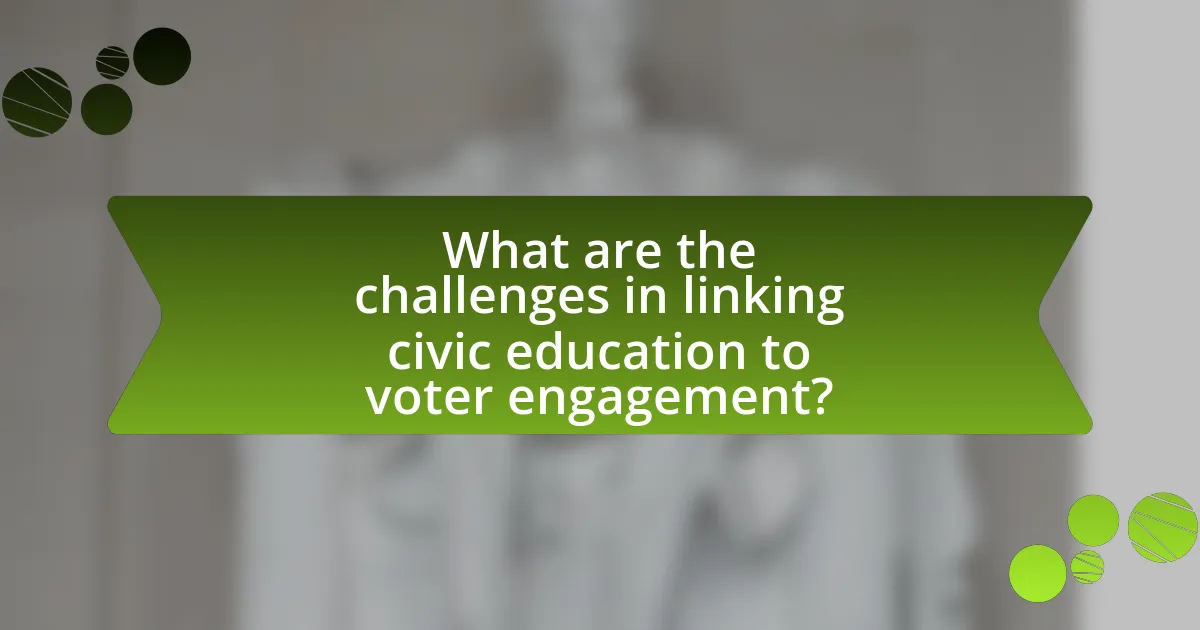
What are the challenges in linking civic education to voter engagement?
The challenges in linking civic education to voter engagement include a lack of standardized curriculum, insufficient resources, and varying levels of student interest. A lack of standardized curriculum means that civic education can differ significantly between schools, leading to inconsistent knowledge about voting processes and civic responsibilities. Insufficient resources, such as funding and trained educators, can hinder the effectiveness of civic education programs, limiting their reach and impact. Additionally, varying levels of student interest can result in disengagement, as not all students may see the relevance of civic education to their lives, which ultimately affects their likelihood to participate in voting. Studies have shown that students who receive comprehensive civic education are more likely to vote, but without addressing these challenges, the connection between civic education and voter engagement remains weak.
What barriers exist in implementing civic education programs?
Barriers in implementing civic education programs include insufficient funding, lack of trained educators, and varying political support. Insufficient funding limits resources for curriculum development and training, as evidenced by a 2019 report from the Center for Information and Research on Civic Learning and Engagement, which highlighted that many schools lack the budget to incorporate comprehensive civic education. The lack of trained educators results in ineffective teaching methods, as many teachers report feeling unprepared to deliver civic content, according to a survey conducted by the National Council for the Social Studies. Additionally, varying political support can lead to inconsistent program implementation across different regions, as seen in states with differing educational policies regarding civic education.
How do socioeconomic factors affect access to civic education?
Socioeconomic factors significantly affect access to civic education by creating disparities in resources and opportunities available to different populations. Individuals from lower socioeconomic backgrounds often attend underfunded schools that lack comprehensive civic education programs, limiting their understanding of civic responsibilities and rights. For instance, a study by the Center for Information & Research on Civic Learning and Engagement (CIRCLE) found that students in high-poverty schools are less likely to receive quality civic education compared to their peers in affluent areas. This lack of access can lead to lower levels of voter engagement and civic participation, as individuals may not be adequately informed about the electoral process or their role within it.
What are the common misconceptions about civic education?
Common misconceptions about civic education include the belief that it solely focuses on teaching students about government structures and functions. In reality, civic education encompasses a broader scope, including the development of critical thinking skills, civic engagement, and the importance of active participation in democracy. Additionally, many people mistakenly think that civic education is only relevant for high school students; however, effective civic education can and should begin in elementary school to foster informed citizenship from an early age. Research indicates that comprehensive civic education positively influences voter engagement, as students who receive quality civic instruction are more likely to participate in elections and community activities.
How can these challenges be addressed?
To address the challenges in connecting civic education and voter engagement, implementing comprehensive civic education programs in schools is essential. These programs should focus on teaching students about the electoral process, the importance of voting, and how to engage in civic activities. Research indicates that states with robust civic education requirements see higher voter turnout among young adults; for instance, a study by the Center for Information & Research on Civic Learning and Engagement found that civic education significantly increases the likelihood of voting among high school students. Additionally, fostering partnerships between educational institutions and community organizations can enhance real-world engagement, providing students with opportunities to participate in local governance and civic activities, thereby reinforcing the lessons learned in the classroom.
What strategies can enhance civic education effectiveness?
To enhance civic education effectiveness, integrating experiential learning strategies is crucial. Experiential learning, such as simulations of democratic processes or community service projects, actively engages students and fosters a deeper understanding of civic responsibilities. Research indicates that students who participate in hands-on civic activities demonstrate higher levels of civic knowledge and engagement, as evidenced by a study from the Center for Information and Research on Civic Learning and Engagement, which found that students involved in service-learning programs are more likely to vote and participate in civic activities. Additionally, incorporating diverse perspectives and discussions on current events can stimulate critical thinking and encourage students to form their own informed opinions, further enhancing the effectiveness of civic education.
How can communities foster greater voter engagement through education?
Communities can foster greater voter engagement through education by implementing comprehensive civic education programs that inform citizens about the electoral process, their rights, and the importance of participation. Research indicates that states with robust civic education curricula see higher voter turnout; for example, a study by the Center for Information & Research on Civic Learning and Engagement found that students who receive civic education are 2.5 times more likely to vote. Additionally, organizing workshops, town hall meetings, and partnerships with local organizations can enhance awareness and motivate individuals to engage in the voting process.
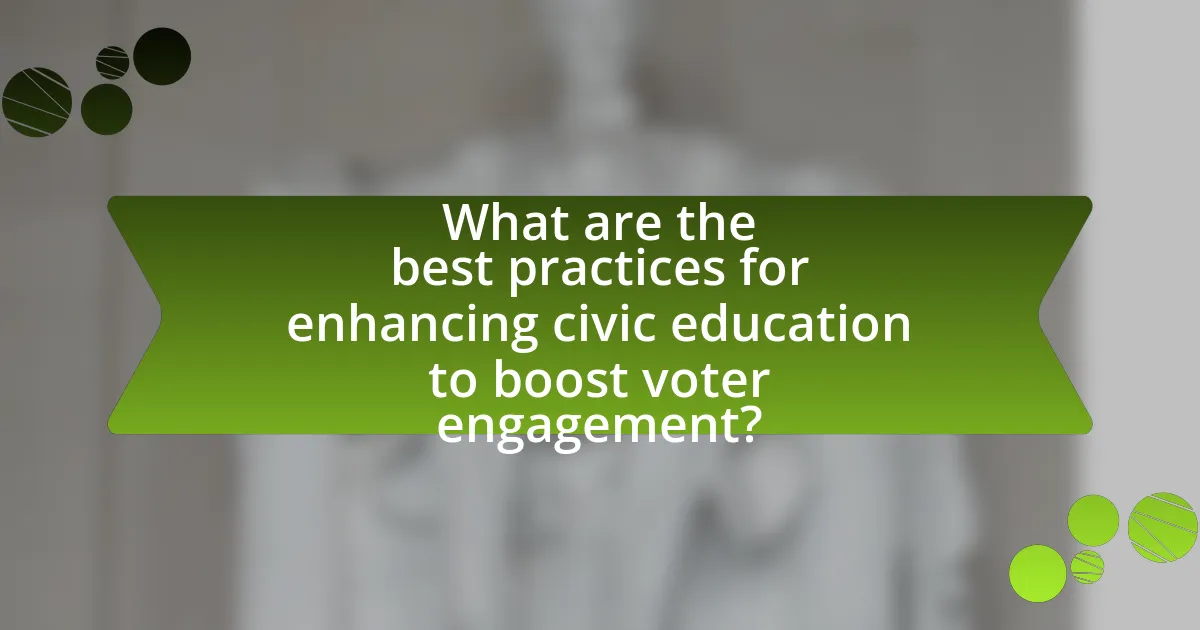
What are the best practices for enhancing civic education to boost voter engagement?
The best practices for enhancing civic education to boost voter engagement include integrating experiential learning, fostering critical thinking, and utilizing technology. Experiential learning, such as simulations of the electoral process, has been shown to increase students’ understanding of civic responsibilities and their likelihood to participate in elections. Research from the Center for Information & Research on Civic Learning and Engagement indicates that students who engage in hands-on civic activities are more likely to vote. Fostering critical thinking through discussions about current events and policy issues encourages students to form their own opinions and understand the importance of their vote. Additionally, utilizing technology, such as online platforms for civic education, can reach a broader audience and engage younger voters effectively. Studies have shown that digital tools can enhance accessibility and interest in civic topics, leading to higher voter turnout.
What successful models of civic education exist?
Successful models of civic education include the We the People program, which promotes understanding of the Constitution and democratic principles through interactive learning, and the Close Up Foundation, which offers experiential learning opportunities in Washington, D.C. These models have demonstrated effectiveness in increasing civic knowledge and engagement among students. For instance, research by the Center for Information and Research on Civic Learning and Engagement (CIRCLE) shows that students participating in such programs are more likely to vote and engage in community activities, highlighting the positive correlation between civic education and voter engagement.
How do these models engage different demographics?
Models engage different demographics by tailoring civic education content to the specific interests and needs of various groups. For instance, younger demographics often respond well to interactive and digital platforms, which can include gamified learning experiences that make civic education more relatable and engaging. In contrast, older demographics may prefer traditional formats such as workshops or community meetings that allow for direct interaction and discussion. Research indicates that targeted outreach strategies, such as using social media for younger audiences and local community events for older individuals, significantly enhance engagement levels. A study by the Pew Research Center found that 70% of young adults are more likely to participate in civic activities when they are presented through platforms they frequently use, demonstrating the effectiveness of demographic-specific approaches.
What lessons can be learned from these successful programs?
Successful programs in civic education demonstrate that comprehensive curricula significantly enhance voter engagement. These programs often incorporate interactive learning methods, such as simulations and discussions, which foster critical thinking and a deeper understanding of democratic processes. For instance, research by the Center for Information & Research on Civic Learning and Engagement (CIRCLE) indicates that students who participate in civic education programs are more likely to vote and engage in community activities. Additionally, successful programs emphasize the importance of inclusivity and accessibility, ensuring that diverse populations are represented and educated about their voting rights. This approach not only increases participation rates but also strengthens the overall democratic process.
What practical steps can individuals take to promote civic education?
Individuals can promote civic education by actively participating in community discussions and workshops focused on civic issues. Engaging in local governance, such as attending town hall meetings or school board sessions, allows individuals to learn about civic responsibilities and share knowledge with others. Additionally, volunteering for organizations that advocate for civic education, like the League of Women Voters, helps disseminate information and resources. Research indicates that communities with higher civic engagement often see increased voter turnout, highlighting the importance of informed citizens in a democracy.
How can community organizations contribute to civic education efforts?
Community organizations can significantly contribute to civic education efforts by providing resources, facilitating discussions, and organizing events that promote civic knowledge and engagement. These organizations often serve as trusted local hubs, enabling them to reach diverse populations and tailor educational programs to meet specific community needs. For instance, research from the National Civic League indicates that community-based initiatives can increase voter turnout by up to 20% by educating citizens about their rights and the electoral process. By leveraging their local presence and networks, community organizations can effectively enhance civic awareness and participation among residents.
What role do schools play in fostering civic engagement?
Schools play a crucial role in fostering civic engagement by providing students with the knowledge, skills, and values necessary for active participation in democratic processes. Through civic education curricula, schools teach students about government structures, civic responsibilities, and the importance of voting, which equips them to engage meaningfully in their communities. Research indicates that students who receive comprehensive civic education are more likely to vote and participate in civic activities as adults, demonstrating the long-term impact of school-based civic engagement initiatives. For instance, a study by the Center for Information and Research on Civic Learning and Engagement found that high school students who participated in civic education programs were significantly more likely to vote in subsequent elections compared to their peers who did not receive such education.
How can technology be leveraged to improve civic education and voter engagement?
Technology can be leveraged to improve civic education and voter engagement by utilizing digital platforms for interactive learning and outreach. Online resources, such as educational websites and mobile applications, provide accessible information about civic rights, responsibilities, and the voting process. For instance, platforms like iCivics offer engaging games and simulations that teach students about government functions and civic participation. Additionally, social media campaigns can effectively mobilize voters by disseminating information about registration deadlines, polling locations, and election dates, as evidenced by the increase in voter turnout during the 2020 U.S. elections, where digital outreach played a significant role. Furthermore, data analytics can identify and target underrepresented communities, ensuring that civic education efforts reach those who may benefit the most.
What digital tools are effective in promoting civic knowledge?
Digital tools effective in promoting civic knowledge include educational websites, mobile applications, social media platforms, and online courses. Educational websites like iCivics provide interactive resources that teach users about government and civic responsibilities, while mobile applications such as Vote.org facilitate voter registration and provide election information. Social media platforms, including Facebook and Twitter, serve as channels for civic engagement campaigns, disseminating information quickly to a broad audience. Online courses offered by platforms like Coursera and edX allow users to learn about civic issues at their own pace, enhancing understanding and participation in democratic processes. These tools have been shown to increase civic knowledge and engagement, as evidenced by studies indicating that users of civic education apps report higher levels of political awareness and participation.
How can social media campaigns enhance voter participation?
Social media campaigns can enhance voter participation by effectively reaching and engaging diverse audiences, particularly younger voters. These platforms allow for targeted messaging, which can inform users about registration deadlines, voting procedures, and the importance of civic engagement. For instance, a study by the Pew Research Center found that 69% of adults aged 18-29 use social media to get news, making it a crucial channel for disseminating information related to elections. Additionally, social media campaigns can foster community discussions and mobilize grassroots efforts, as evidenced by the significant increase in voter turnout during the 2020 U.S. presidential election, where social media played a pivotal role in encouraging participation among first-time voters.
What are the key takeaways for individuals interested in promoting civic education?
Key takeaways for individuals interested in promoting civic education include understanding the importance of informed citizenship, fostering critical thinking skills, and encouraging active participation in democratic processes. Informed citizenship is crucial as studies show that individuals with a strong civic education are more likely to vote and engage in community activities. Fostering critical thinking skills enables individuals to analyze information critically, which is essential in navigating complex political landscapes. Encouraging active participation, such as volunteering for campaigns or attending town hall meetings, directly correlates with increased voter engagement, as evidenced by research indicating that civic education programs lead to higher voter turnout rates among participants.
